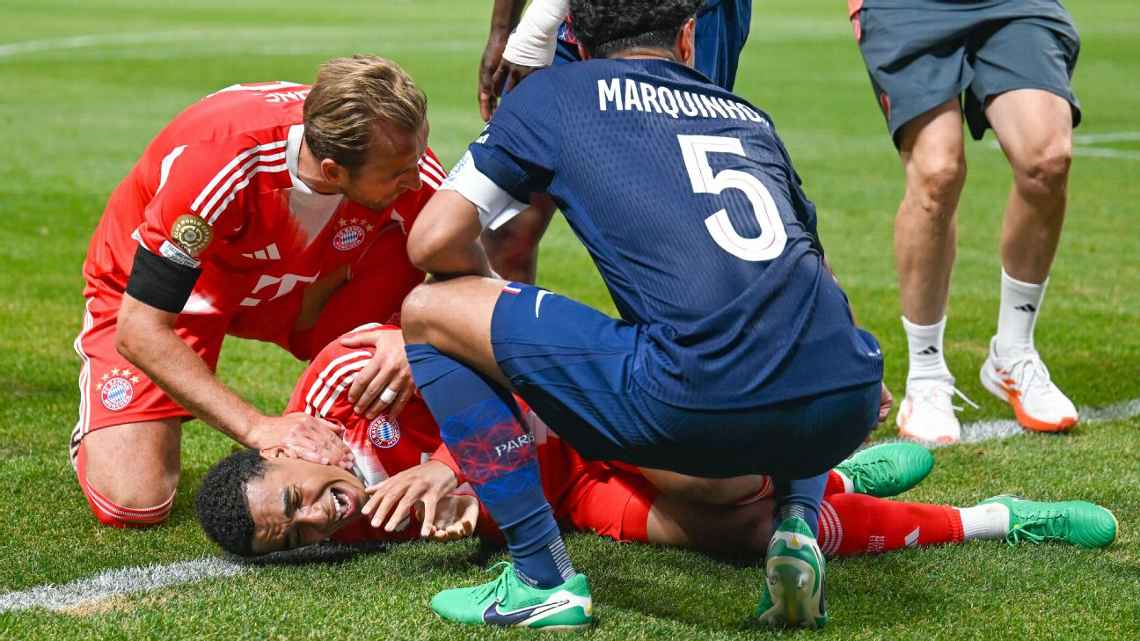The highly anticipated FIFA Club World Cup quarter-final clash between European giants Bayern Munich and Paris Saint-Germain on Saturday took a dramatic and unfortunate turn.
In a moment that overshadowed the high-stakes encounter, Bayern Munich’s exceptionally talented midfielder, Jamal Musiala, sustained a severe injury to his left leg. This incident, occurring late in the first half, sent immediate shockwaves through the stadium and the global football community, casting a long shadow over Bayern’s aspirations in the tournament. The match was played at the impressive Mercedes-Benz Stadium in Atlanta, Georgia, providing a grand stage for what was expected to be a thrilling contest. Instead, it became the site of a potentially significant setback for one of football’s brightest young stars.
The injury occurred during a contested “50-50 challenge” involving Musiala and PSG’s formidable goalkeeper, Gianluigi Donnarumma. Both players bravely committed to reaching a loose ball inside the penalty area. Unfortunately, in the intensity of the moment, Donnarumma’s challenge inadvertently resulted in a collision that left Musiala in considerable distress.
The nature of the collision was such that Musiala’s left leg, particularly his ankle, appeared to become trapped or twisted under the weight and momentum of the collision. This caused visible pain and concern among players and staff from both teams. Adding to the gravity of the situation, the “gruesome injury” was deemed too graphic to be replayed on the big screens within the stadium, a decision that further highlighted the severity of the incident to the thousands of fans in attendance.
The immediate aftermath saw medical personnel quickly rush onto the field to attend to the 22-year-old German international. The referee, recognizing the seriousness of the situation and the need for immediate medical attention, “whistled for the break” to allow Musiala to receive treatment without further delay. The sight of Musiala receiving medical care on the pitch, surrounded by concerned teammates and opponents, was a somber moment.
Bayern Munich’s Sporting Director, Max Eberl, confirmed the gravity of the situation shortly after the game, stating that Musiala “had been taken to hospital” for further assessment and treatment. This swift action underscored the club’s immediate concern for their key player’s well-being.
Bayern’s Head Coach, Vincent Kompany, while refraining from making an official diagnosis, expressed his apprehension regarding the injury. “It didn’t look good,” Kompany remarked, reflecting the general sentiment. He cautiously added, “If I’m just watching the images, it looked like an ankle injury of some kind but I’m not going to make a diagnosis here.” This highlights the immediate uncertainty surrounding the exact nature and extent of Musiala’s injury, leaving fans and the club anxiously awaiting official medical reports.
Early indications from various sources suggest a serious ankle injury, potentially involving ligament damage or even a fracture, which could lead to a prolonged period on the sidelines for the talented midfielder. This unfortunate event has certainly cast a pall over what was meant to be a showcase of top-tier club football.
Musiala’s Impact and Tournament Performance
Jamal Musiala’s injury is not just a blow to Bayern Munich’s immediate tournament hopes; it’s a significant setback for a player who has been in scintillating form this season. The “22-year-old,” who also represents the “Germany’s national team” with distinction, entered Saturday’s Club World Cup match as one of the tournament’s standout performers. His offensive prowess had been on full display, making him a critical component of Bayern’s attacking strategy.
Prior to the PSG encounter, Musiala had already “entered Saturday’s match with three goals in the tournament.” This impressive tally placed him just “one behind Golden Boot leaders Ángel Di María and Marcos Leonardo,” showcasing his effectiveness in front of goal even in a short space of time. His contributions were vital to Bayern’s progression in the Club World Cup. These Club World Cup goals further swelled his overall season’s tally to an impressive “20 goals.” This includes a remarkable “12 goals in the Bundesliga,” where he consistently demonstrates his ability to unlock defenses and convert chances.
Furthermore, he had contributed “three in the Champions League,” proving his mettle on European football’s biggest stage. His ability to score from various positions and in crucial moments makes him an invaluable asset to both club and country. His consistent goal-scoring record highlights his evolution into a truly prolific attacking midfielder.
The timing of Musiala’s injury could not have been worse for Bayern. It occurred “just before halftime,” disrupting their momentum and tactical plans. As Musiala received treatment on the field, the first half concluded, with the score still “0-0.” This meant that Bayern had to adapt immediately for the second half. To fill the void left by Musiala’s unfortunate exit, experienced winger “Serge Gnabry replaced him in the lineup to begin the second half.” This substitution, while bringing in a quality player, still represented a significant disruption to Kompany’s initial game plan. The absence of Musiala’s creativity, dribbling ability, and goal threat was keenly felt as the match progressed.
Ultimately, the match concluded with PSG winning 2-0, securing their place in the semifinals. The Parisian side found their goals despite facing numerical disadvantages late in the game, as “they were reduced to nine men after late red cards for Willian Pacho and Lucas Hernández.” This outcome further underscores the impact of Musiala’s injury on Bayern’s performance, as they struggled to find a breakthrough without their attacking talisman. The focus, however, remained largely on Musiala’s condition rather than the match result itself.
Following the game, PSG’s first goal scorer, Désiré Doué, expressed solidarity with his injured opponent. “We told him he has our support because it’s never easy when this kinds of action ends badly,” Doué stated, emphasizing the mutual respect among professional athletes. He acknowledged the inherent risks of the sport, adding, “It’s also part of football.” Doué concluded with a hopeful message, wishing Musiala well: “Now we want everything to go well for Jamal in his rehabilitation.” This sentiment reflects the broader football community’s concern for Musiala and hopes for his swift and complete recovery.
A Rising Star: Musiala’s Illustrious Career to Date
Jamal Musiala is not merely a talented player; he is widely recognized as a genuine “rising star” in the world of football. His career trajectory has been nothing short of meteoric, marked by significant achievements and milestones at a remarkably young age. His contributions have been vital for both his club, Bayern Munich, and his national team, Germany, establishing him as one of the most exciting prospects in the sport.
His exceptional talent was formally recognized when he earned the prestigious title of “Player of the Year for the German national team in 2024.” This award is a testament to his consistent high-level performances and his growing influence on the international stage. It highlights his importance to Germany’s footballing future. This accolade places him among the elite players in German football.
Furthermore, in 2023, he was the “runner-up in 2023 for the Golden Boy award,” an esteemed honor “which is awarded to Europe’s brightest under-21 talent.” Being nominated for, and nearly winning, such a prestigious youth award further underscores his immense potential and the high expectations placed upon him from a very early stage in his career.
Musiala’s journey at Bayern Munich began at a tender age. He made his senior debut for the Bavarian giants in “2020 when he was just 17.” This remarkable achievement meant he became “the team’s youngest-ever player at the time of his debut,” a record that speaks volumes about his precocious talent and the trust placed in him by the club’s coaching staff. His rapid ascent from the youth ranks to the senior team demonstrated his readiness for top-flight football.
His international career has been equally impressive. Despite his youth, Musiala has already made history with the German national team. In “2022, he became the first teenager to appear for Germany at a World Cup since 1958.” This statistic emphasizes his unique position in German football history, breaking a long-standing record and showcasing his ability to perform on the biggest international stage. His fearless approach and technical brilliance have made him a fan favorite for both club and country.
Musiala’s ability to seamlessly transition from youth football to the elite level, consistently delivering impactful performances, marks him out as a truly special talent. His injury is a setback, but his track record suggests a strong resolve to overcome challenges and return to his dazzling best. The football world will be keenly watching his recovery process, eager to see this bright star back on the pitch.








